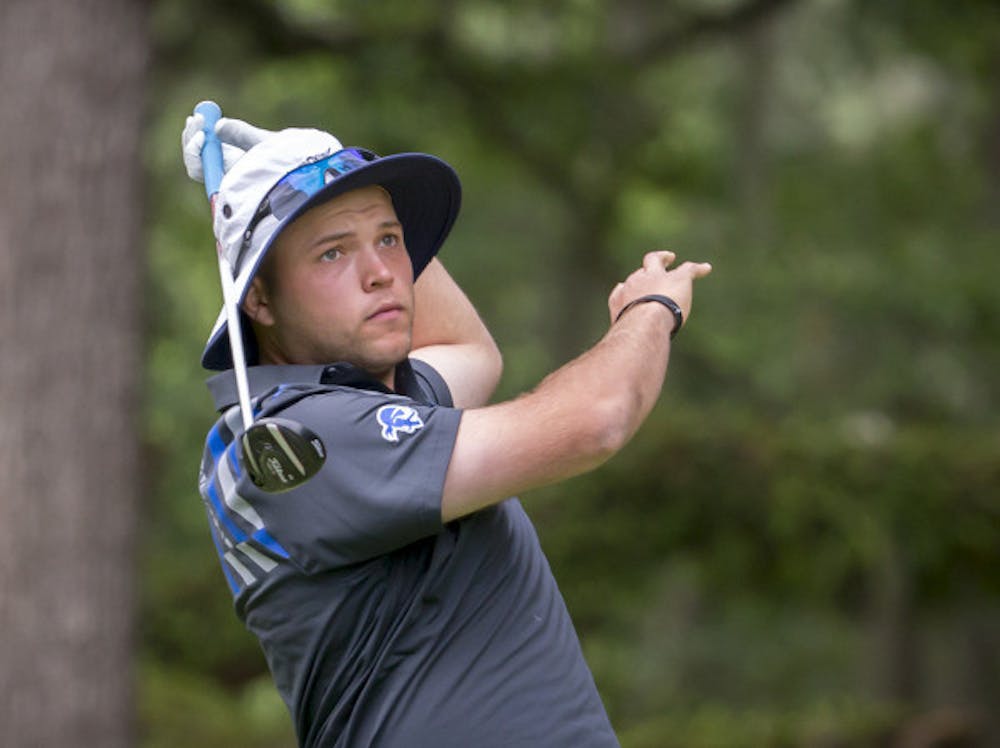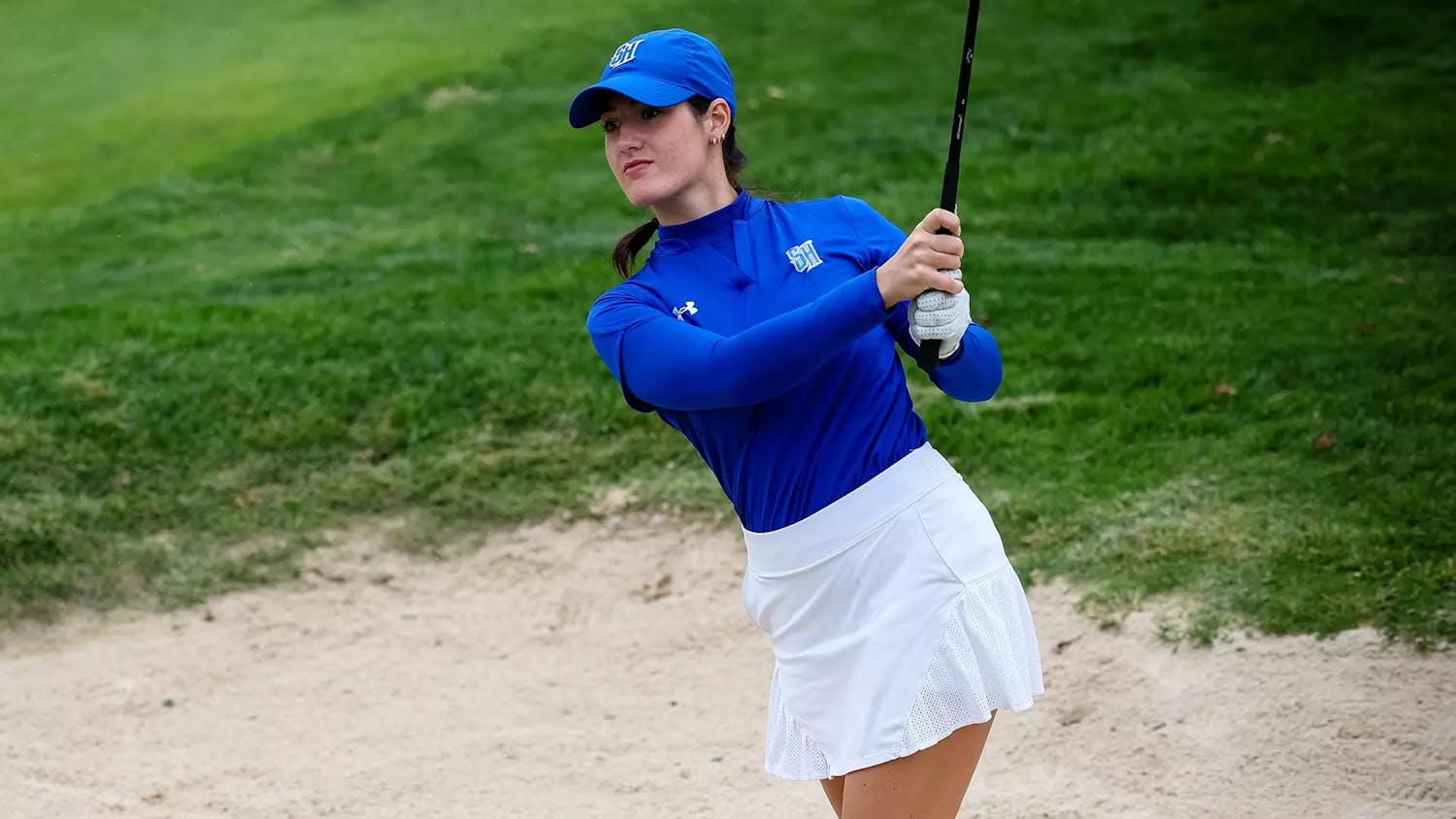[caption id="attachment_10726" align="alignnone" width="600"] Seton Hall Athletics[/caption]
Confidence can be a tough emotion to describe. As much as it can fuel us, a lack of it can hold anybody back.
Senior golfer Ryan Snouffer’s dream is to become a professional on the PGA Tour when he finishes his career at Seton Hall. But the mental part of the game is still standing in the way of his dream.
“It’s hard to explain and understand,” Snouffer said. “I am struggling a little bit with the mental side of the game. It is a work in progress.”
Many athletes have the talent to become professionals, but the mental side of the game gets in the way, and that can involve a lack of confidence or belief in one’s self.
Seton Hall coach Clay White is confident that if Snouffer finds that belief, he can make it.
“He has the talent,” White said. “He has to grow a little bit and work on the mental part of his game. He could do it.”
Since transferring to Seton Hall from Division II Adelphi University, Snouffer has put up some impressive numbers. In his Pirate career, he has six top-10 finishes, a top-five finish and 11 rounds where he has finished under par, including six rounds under 70.
However, the consistency on the course still needs improvement. At the Hartford Hawks Invitational last Monday and Tuesday, Snouffer shot an opening round 67. The best round of his Seton Hall career was followed up by a 73, but then a career-worst 82 in the final round.
Seton Hall Athletics[/caption]
Confidence can be a tough emotion to describe. As much as it can fuel us, a lack of it can hold anybody back.
Senior golfer Ryan Snouffer’s dream is to become a professional on the PGA Tour when he finishes his career at Seton Hall. But the mental part of the game is still standing in the way of his dream.
“It’s hard to explain and understand,” Snouffer said. “I am struggling a little bit with the mental side of the game. It is a work in progress.”
Many athletes have the talent to become professionals, but the mental side of the game gets in the way, and that can involve a lack of confidence or belief in one’s self.
Seton Hall coach Clay White is confident that if Snouffer finds that belief, he can make it.
“He has the talent,” White said. “He has to grow a little bit and work on the mental part of his game. He could do it.”
Since transferring to Seton Hall from Division II Adelphi University, Snouffer has put up some impressive numbers. In his Pirate career, he has six top-10 finishes, a top-five finish and 11 rounds where he has finished under par, including six rounds under 70.
However, the consistency on the course still needs improvement. At the Hartford Hawks Invitational last Monday and Tuesday, Snouffer shot an opening round 67. The best round of his Seton Hall career was followed up by a 73, but then a career-worst 82 in the final round.
 Seton Hall Athletics[/caption]
Confidence can be a tough emotion to describe. As much as it can fuel us, a lack of it can hold anybody back.
Senior golfer Ryan Snouffer’s dream is to become a professional on the PGA Tour when he finishes his career at Seton Hall. But the mental part of the game is still standing in the way of his dream.
“It’s hard to explain and understand,” Snouffer said. “I am struggling a little bit with the mental side of the game. It is a work in progress.”
Many athletes have the talent to become professionals, but the mental side of the game gets in the way, and that can involve a lack of confidence or belief in one’s self.
Seton Hall coach Clay White is confident that if Snouffer finds that belief, he can make it.
“He has the talent,” White said. “He has to grow a little bit and work on the mental part of his game. He could do it.”
Since transferring to Seton Hall from Division II Adelphi University, Snouffer has put up some impressive numbers. In his Pirate career, he has six top-10 finishes, a top-five finish and 11 rounds where he has finished under par, including six rounds under 70.
However, the consistency on the course still needs improvement. At the Hartford Hawks Invitational last Monday and Tuesday, Snouffer shot an opening round 67. The best round of his Seton Hall career was followed up by a 73, but then a career-worst 82 in the final round.
Seton Hall Athletics[/caption]
Confidence can be a tough emotion to describe. As much as it can fuel us, a lack of it can hold anybody back.
Senior golfer Ryan Snouffer’s dream is to become a professional on the PGA Tour when he finishes his career at Seton Hall. But the mental part of the game is still standing in the way of his dream.
“It’s hard to explain and understand,” Snouffer said. “I am struggling a little bit with the mental side of the game. It is a work in progress.”
Many athletes have the talent to become professionals, but the mental side of the game gets in the way, and that can involve a lack of confidence or belief in one’s self.
Seton Hall coach Clay White is confident that if Snouffer finds that belief, he can make it.
“He has the talent,” White said. “He has to grow a little bit and work on the mental part of his game. He could do it.”
Since transferring to Seton Hall from Division II Adelphi University, Snouffer has put up some impressive numbers. In his Pirate career, he has six top-10 finishes, a top-five finish and 11 rounds where he has finished under par, including six rounds under 70.
However, the consistency on the course still needs improvement. At the Hartford Hawks Invitational last Monday and Tuesday, Snouffer shot an opening round 67. The best round of his Seton Hall career was followed up by a 73, but then a career-worst 82 in the final round.
“Can you be consistent enough and do it when the tournament is on the line?” White said in regard to what is takes to become a professional golfer. “I think he is close to putting together some good tournaments. He’s just not finishing.”
The process to becoming a professional golfer is different than other sports. In golf, there are no teams and certainly no draft. Players have to navigate through qualifying rounds and win tournaments if they want a PGA Tour Card.
However, there are other ways to play in PGA Tournament events.
“Hopefully next spring I’ll be ready to go for the U.S. qualifiers,” Snouffer said, “It would be pretty cool to say I played in the U.S. Open as an amateur.”
The winner of the 2015 U.S. Open was American golf superstar Jordan Spieth, who was awarded $1.8 million. The winner of next year’s championship will likely win even more than that. Players who finished anywhere between second and 75th made anywhere from $21,332 to upwards of $877,144. Despite a number of amateurs finishing in that range, they saw none of the U.S. Open’s $10 million purse.
One person who Snouffer looks to for an example to follow is Spieth. The current world No. 1 is coming off his best year as a professional that included wins at the Masters, U.S. Open and FedEx Cup Championship.
“I like to look up at Spieth, who he is and how he goes about his game,” Snouffer said. “I see a quote from him and make it something that I would say.”
One thing Spieth definitely did this season was make money. According to the Dallas Morning News, Spieth made just over $22 million this year alone, which includes the U.S Open title. The goal of a professional golfer is to make money in order to take care of his or her family, but it is easier said than done.
Not everyone who golfs on the PGA Tour makes enough money to support themselves, let alone a family.
On top of that, golfers sometimes have to pay hundreds of dollars to play in many of the tournaments on tour.
That can add up, especially if the player is not winning or finishing high in events. Entrance fees, locker room fees and others can really pile up.
“There is always thoughts of making a living in golf,” Snouffer said, “I don’t worry about it and work my butt off.”
Snouffer plans on finishing his career at Seton Hall strongly as he continues to work on his confidence and mental sharpness on the course.
The senior could also golf on the Web.com Tour following graduation, which is a series of tournaments where amateurs can compete in with the goal of becoming a professional. The top-25 on the money list and top-25 in the PGA Tour Qualifying Tournament receive a card. However, he is still weighing his options.
The process seems stressful because it is, but Snouffer has a hired a caddy, if you will, for his confidence issues.
Snouffer actually has a sports psychologist who has helped him to “change the outlook on confidence to more of a belief.”
The senior believes that if he continues to improve his short game and positive outlook on golf, he can make it. Snouffer has a long way to go, but he is up for the challenge.
“Confidence is temporary, so you need to have consistent belief in yourself,” Snouffer said.
Who knows? One day he might find himself in a final pairing with none other than Spieth himself at a future U.S. Open. Because in golf, anybody can become a champion.
Sean Saint Jacques can be reached at sean.saintjacques@student.shu or on Twitter @SSaintJ7





